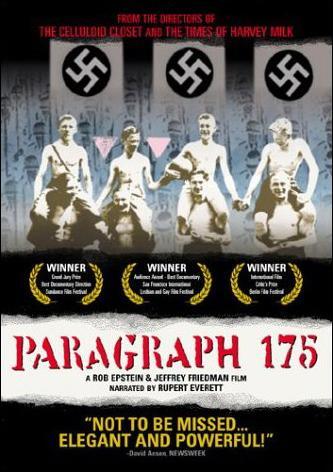Paragraph 175

Historian Klaus Müller interviews survivors of the Nazi persecution of homosexuals because of the German Penal Code of 1871, Paragraph 175. PARAGRAPH 175 is a documentary about the 10-15,000 German men who were arrested because of their homosexuality between the years 1933-1945 during World War II. Some of the men were sent to concentration camps to be killed; an estimated 4,000 survived. PARAGRAPH 175, from directors Rob Epstein and Jeffrey Friedman (THE CELLULOID CLOSET), tells the tragic story and includes interviews with seven of only nine living survivors. It was Klaus Müller, curator of the U.S. Holocaust Memorial Museum, who convinced directors Epstein and Friedman of the urgent need to make the film PARAGRAPH 175. Despite their small number of survivors who remain to tell the tale, their accounts unearth a rich trove of anecdotal history. The stories of their treatment are both lyrical and horrific. These 20th-century gay Germans lived freely through the Weimar years. In the 1930s, they were initially ignored by an indifferent Hitler. Then, with the implementation of an obscure legal statute (Paragraph 175) which aimed to exterminate homosexuals entirely, they became the victims of a brutal persecution. Rupert Everett's solemn narration puts the stories in context, as do photographs, footage, and music that remind us of the eerie wistfulness of pre-Nazi Germany. The filmmakers also put the text of anti-homosexual laws and political statements right on the screen, along with a chillingly complete chart of symbols to be worn by camp prisoners (gay men wore a pink triangle). Ultimately, the film is a chance for a forgotten group of victims (they have never received reparations) to tell their story. They very nearly did not get the chance.